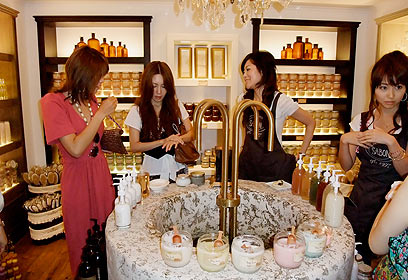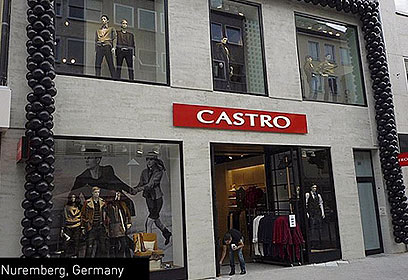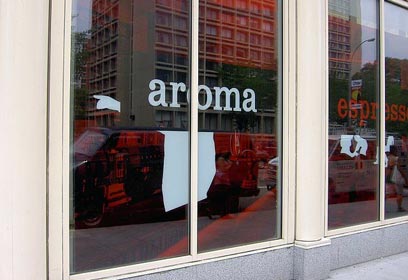
Are Israeli stores abroad proud of where they come from?
They don't hide where they are from because they can't, but avoid emphasizing Israeliness in places where it could draw negative responses. We asked large Israeli stores and chains operating overseas what its like being Israeli abroad
Don't deny it. You, too, have denied being from Israel, preferring to answer "the US" when a taxi driver asked you where you're from. Not because there is anything wrong with Israel, but mainly because you don't feel like dealing with the responses that could range anywhere from an angry nod to being thrown out of the cab.
Neither are Israeli stores received with kisses and warm embraces abroad. It's hard to sell a product "Made in Israel" without activists groups calling for it to be boycotted. Nonetheless, there is no small number of products being marketed and sold around the world under an Israeli stamp.
Of course, Israeli companies adapt themselves to local markets and consumer preferences. In most places, if they can avoid it, large Israeli chains won't be quick to pull out the Israelis flags and the hamsas, and will rely on the best of camouflages. Only in a few select locales will they present their Israeliness with pride.
In Holland, don't say product is Israeli
Sabon Shel Paam was successful in breaking into the European market under the name Sabon, which is not associated with any nation. However, its products are stamped with a telltale "Made in Israel." The body and skin-care shop started its endeavors abroad in 2002, and quickly made it in New York. It currently operates 60 stores in the US, Canada, Holland, Italy, Poland, Romania, and Japan.
"All of the products from A to Z are made in Israel in the factory in Kiryat Gat," said the store's CEI, Ronen Zohar. "They provide a strong base. If the products are good, the chain is good."

Sabon in Japan
The chain sells products like soap with loofa, products with olive oil and figs that aren't as common as they are in Israel.
When asked how customers abroad respond to the fact the store is Israel, Zohar answered, "In New York, they love Israel a lot, and there is a lot of pride in this," he said. "Likewise in Japan. There are other countries, European countries, in which the responses are less favorable. The salespeople in New York say the product is from Israel as part of the sales pitch, not so in Holland."
Castro sells a Christmas collection
Castro has an easier time blurring its Israeli identity.
However, "Everyone in Germany knows it's an Israeli chain," presumed Gabi Rotter, a co-CEO, though the 15 stores in the country don't display too many indications of such. Most of the clothes aren't made in Israel, and the tags don't disclose where the company is from.
The Christmas collections sold by the company also make the connection to Israel a bit more vague.

Castro in Germany
The chain has four stores in Switzerland, three in Kazakhstan, and 10 in Thailand, the latter arousing unexpected fans. "Israelis who visit the stores in Thailand are very enthusiastic," said Rotter. "They send us pictures from there and talk about national pride."
Aroma: Innovative and quality in Ukraine
Aroma coffee shops also have a name that is seen as not particularly Israel. The chain has three shops in Manhattan with a fourth underway, and six stores slated to be built in Miami. There are three (going on four) branches in Toronto. It also has branches in Kiev, Alma Ata, Bucharest, and Limassol.

Aroma in New York
"Aroma is called innovative and quality in Ukraine," said Yigal Sharon, the CEO of Aroma Israel. He also said that a mall slated to be opened in Canada is using Aroma in its advertising, saying that a coffee shop successful in Toronto will be opened in the store.
Have there been bad responses?
"In Canada, to the best of my knowledge, there were Palestinians who sought to boycott the Israeli coffee shop. It was a voice heard at the very beginning and pretty much died out. On the day-to-day, after all, you act out of your convenience."
Most of the products, including the coffee and the bread, are made in Israel in order to maintain the brand line.
Teva Naot: We are appreciated more abroad
The most proud of their Israeli roots is the brand Teva Naot. "Today, 65% of our production is exported," said Teva Naot CEO Michael Illouz. "Naot is a strong brand carried by all chains. We have 20 stores in Germany, seven in Canada, and one in Australia."
Everything is made in Israel?
"Definitely. Every shoe is stamped with 'Made in Israel.' Our roots are nourished from the land of the Hula Valley. Our designers also are entirely Israeli. We think of fashion in Hebrew and bring this to the rest of the world.
"During the last war, the factory operated under fire. There were rumors in the business that we wouldn't be able to produce a collection for the shoe expo in Las Vegas. We purchased flak jackets and worked hard and even got the collection out earlier than usual," Illouz said.
"Abroad, we are very highly esteemed, and we receive praises from consumers and prizes from podiatrists. Only in Israel people say, 'Great shoe, it's really comfortable, but why does it cost NIS 300 (about $80).'"










